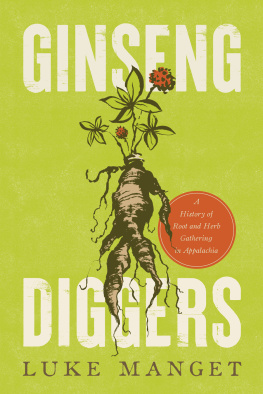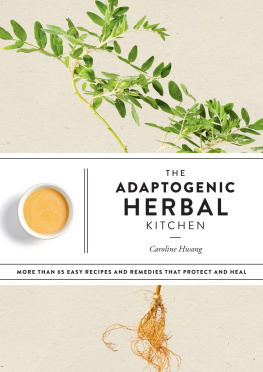
GINSENG, The Divine Root
DAVID A. TAYLOR
Algonquin Books of Chapel Hill
Published by
ALGONQUIN BOOKS OF CHAPEL HILL
Post Office Box 2225
Chapel Hill, North Carolina 27515-2225
a division of
Workman Publishing
225 Varick Street
New York, New York 10014
2006 by David A. Taylor. All rights reserved.
Library of Congress Cataloging-in-Publication Data is available for a previous edition of this work.
E-book ISBN 978-1-56512-744-9
For my parents,
Bill and Nancy Taylor
SEN. ROCKEFELLER:... I would say to the good senator from New York, if youre looking for good ginseng, come to West Virginia, sir. We have the best.
SEN. MOYNIHAN: There are arguments. Delaware County, New York, is(laughter)still ahead among the Chinese elite, no doubt about it. Chairman Mao smoked only ginseng cigarettes from Delaware County. West Virginia is close. (Laughter.)
Capitol Hill hearing, June 6, 1996
Hell, I wasnt aiming on shooting nothing today, Is just looking for sang, he said. Got me a alimony payment due.
Oh, well, then, she said, nodding seriously, good thing you brought that rifle. Sang plants can get real mean in breeding season.
BARBARA KINGSOLVER, Prodigal Summer, 2000
Do you think I wanted to walk with this woman? She was talking about ginseng for an hour and a half!
LARRY DAVID, Curb Your Enthusiasm, 1999
CONTENTS
INTRODUCTION
The Cherokees speak of the plant as a sentient being... able to make itself invisible to those unworthy to gather it.
WILLIAM BARTRAM, naturalist, Philadelphia, 1791
RESTING ON MY DESK is a single dried ginseng root. It looks small and insubstantial, a shriveled, pale brown finger against a dark background. This one is four years old and came from a craft shop in Cherokee, North Carolina.
Few Americans would recognize this root as ginseng. Most people think of ginseng as a Chinese herb used in energy-boosting food supplements. A visit to a health-food super-market reveals a staggering array of them. The soft-drink aisle launches a rainbow brigade of shrink-wrapped bottles that list ginseng on their labels. The tea section has its own universe of ginseng items, from Yogi Tea to American Ginzing herbal tea. Even industry stalwart Lipton sells yellow boxes of Lemon Ginseng tea bags. In the dietary supplement section, shelves and shelves are devoted to ginseng capsules and tinctures of all kinds, often packaged with images of white-haired Asian philosophers or powerful dragons.
The root on my desk, however, is simply American ginseng, Panax quinquefolius, a native to North American forests and virtually identical to its sister in Asia, Panax ginseng. Asian ginseng has indeed been used for several thousand years as a popular health tonic. Less known is the fact that for nearly three centuries, this surprising family resemblance between the two plants has led American ginseng to navigate a labyrinthine passage around the world.
This ginseng root holds other surprises. For one thing, its harder than youd expect of an herb. Biting off a piece is like snapping a half-inch wooden dowel in two. Even before a small piece reaches my mouth, I smell the soil it came from. I place the root on my tongue and the tannic tang reminds me vaguely of cloves. Not exactly a pleasant taste, its been described as slightly aromatic, or like licorice root. The flavor evokes an earlier age, a time of sarsaparilla and anise seed. The root catches on my teeth, and within a minute its woody texture gives way to fibrous threads.
IF YOU LIVE NEAR mountains in the eastern half of North America, you can wander the woods for days, hoping to find a ginseng plant in the wild. I have kept my eyes open on many hikes where the terrain looked right: shady, north-facing slopes, mossy rock outcroppings, clusters of hardwood trees. But ginseng is a shy creature. Novice visitors always need an introduction from someone who knows the herb well. Its not like other famous forest residents. Oak and walnut trees are easily recognizable, lording over the forest like statuesque movie stars. Ginseng isnt like that. It blends in easily with other plants, such as poison oak. Yet a Park Service botanist who has tromped the Great Smokies for years says that of all the rare plants in the woodsof all the ones that she could choose in the forests vastnessginseng is her favorite. She enjoys tracking its aboveground life as it races through the seasons, from a single stem in spring, to a flush of leaves, to sports-car-red berries that last just a week in mid-summer. By fall, its leaves turn a pale yellow before the plant seems to disappear altogether.
Below the soil, however, the root (technically, a rhizome) continues to develop with painfully slow deliberation. Each year adds a wrinkle on its neck, establishing a unique signature, like a trees rings. And while that signature might seem meaningless hidden in the forest, it will gain significance later. For generations of collectors who call themselves ginsengers, that root and its wild signatures have been an excellent reason for an autumn walk in the woods. People in Pocahontas County, West Virginia, can still point to farms that were bought with ginseng money. More often, digging ginseng roots and selling them to a buyer in a bait shop down the road produced enough cash to buy Christmas gifts or school supplies. When the crunch of dead leaves and sunlight against bare tree trunks signaled darker days coming, ginseng promised that Christmas bonus.
American ginsengers through the centuries were happy to collect the roots to sell, but it was rare for them to chew the root themselves. And theres still a good deal of debate among American doctors about whether ginseng does any good. Depending on who you ask, ginseng either works to catalyze the bodys vital energy, or it acts as a mild tonic and antioxidant, or its a fraud. Some U.S. researchers have found that certain chemicals in American ginseng may protect brain cells against degenerative conditions like Parkinsons disease. No one denies, though, that ginseng has, at least, a very powerful effect on the imagination. Few elements of nature have inspired such an enormous range of creative responses as ginseng. This refers not only to farmers who have tried to grow it and researchers who have devised new ways to study the herbs chemical compounds, but also to the hucksters who for so long hawked ginseng as an aphrodisiac. (The world of ginseng holds an abundance of lowbrow imagination. Seedy massage parlor owners in Hong Kongs Kowloon Tong have figured out how to infuse ginseng into their sauna baths to boost revenues, and the ways to invoke ginseng in fraudulent mail-order schemes that promise better sexual performance are seemingly infinite.) Ginseng has inspired poems, stories, novels by Jack London and others, dance numbers, paintings, and the slide-guitar sounds of Ginseng Sullivan, a song that recounts the trials of a soul digging ginseng in cold, hard ground.
Few plants have been as vividly anthropomorphized as the one known in Chinese as the divine herb, the king of herbs, and the returned cinnabar with the wrinkled face. Whether in an Appalachian ginsengers tale or a Chinese legend, stories about ginseng testify to an amazement at the plants capacity to endure, and they speak to our own aspirations for weathering change. Wild ginseng has grown scarce, and the ginsengers way of life, passed from father to son, may be passing. But in many places people still talk of the plant as having a thrill to it.
I love to fool with that ginseng, George Albright, a digger in West Virginia, told me. You dont know what its going to do.
Next page





